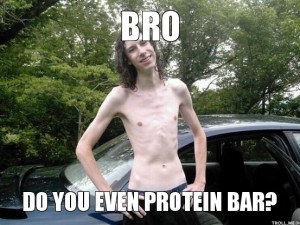Protein is one of the three main macro-nutrients we ingest to nourish our bodies, protein is broken down to amino acids which have several physiological roles within the body, they are involved in rebuilding and repairing tissues structures such as muscles, tendons, ligaments, they help manufacture enzymes and hormones, and support the immune system to name but a few. If we don’t get an adequate intake through our diet, many vital functions shut down.
Protein comes from the Greek word Proteious which means – of first importance, a fact that the Government seemed to skim over when they set the RDA’s or recommend daily allowance. They still recommend most of our calorie intake come from Carbohydrates! Give it another decade and they might finally catch up!
Its important to eat complete protein, this means proteins that contain all of the 8 essential amino acids, excellent sources include meat, eggs, and fish, plant protein sources are incomplete (vegetarians take note) and so food combining is necessary to ensure no deficiencies. The Governments RDA’s only cover you for NEAT (non exercise activity thermogensis) and to prevent you from getting ill or catching diseases such as scurvy. If you have an active lifestyle, engage in weight training or other strength based exercise or play sport you will need considerably more.
Having an adequate protein intake is particularly important when your goal is fat loss, there are two main reasons, the first one being it will spare and protect your muscle mass from being catabolised for energy during intense exercise. This usually happens if your protein intake and over all calories are too low. Losing muscle mass is detrimental to your fat loss efforts, not only will you be weaker in the gym but your metabolism will slow down to save energy and fat loss will come to a halt. The second reason to ensure enough protein is because of its satiety and ability to switch off hunger hormones. Protein takes energy to be broken down in the intestinal track and creates a need for energy known as TEF (thermic effect of eating), this stimulates your metabolism and you burn more calories, further to this you will feel full up and satisfied for longer periods, and your blood sugar will be stabilised so you are less likely to go hunting for a snack. Eating protein with a fat and fibre source will slow the digestion even further, a perfect accompaniment for this would be an avocado.
To calculate your daily requirements its suggested by experts that 0.75 grams per pound of body weight is a good place to start. This may seem like a lot if you are not used to eating so much, but its absolutely necessary and remember, its helping you recover from training and reduce your body fat. If you struggle with this increase, do it slowly, especially if you are a chronic under eater and have been described as “in storage mode”. Any large bump in daily calories and you could be storing them rather than using them. Eating 200 grams of protein spread over 3 meals will be hard going and its debatable whether you will be able to digest such quantities effectively, therefore consider increasing your meal frequency to optimise nutrient uptake. 30-60 grams of protein in one sitting is about right, any more than that and you are jeopardising those nutrients arriving safely to do their work.
There are some reports on safety of a high protein diet and if you have a history of renal (kidney) disease and failure you may see some negative effects from such a high intake. However recent research has shown no ill effects in those with healthy kidneys, and other concerns such as calcium loss and kidney stones are unsubstantiated.
So in a nutshell –
Increasing protein intake = increased lean tissue = stronger in the gym = better recovery = faster metabolism = quicker fat loss!
and
More energy, healthier looking skin, hair etc, less hunger, stronger immune system, better mood = happy days!
Here are what I would consider to be the best readily available sources and there average protein content per 100 grams of food.
Animal protein
Lean beef/mince – 20 grams
Pork loin – 19 grams
Chicken breast – 30 grams
Eggs (1 large) – 7 grams
Turkey – 29 grams
Calf’s liver – 20 grams
Sirloin steak – 26 grams
Seafood/fish
Mackerel fillets – 20 grams
Sardines – 25 grams
Haddock – 20 grams
Salmon – 24 grams
Herring (also highest creatine content of all foods) – 22 grams
Canned tuna – 40 grams per can
Plant protein
Chick peas – 5 grams
Black beans – 6 grams
Kidney beans – 5 grams
Split peas – 8 grams
Lentils – 9 grams
Pumpkin seeds – 19 grams
Hemp seeds – 37 grams
Sunflower seeds – 21 grams
Chia seeds – 16 grams
Dairy protein
Cottage cheese – 11 grams
Whey protein powder (per scoop) – 20 grams
Milk protein powder – (per scoop) – 24 grams
Spend some time looking at the food label and familiarise yourself with protein contents of foods, the more you do this the easier it becomes to ensure an adequate intake.
Always choose the best cut or highest quality, always prepare your meals from fresh and rotate your proteins frequently.
I use Rare the butcher on North st, Bristol. They are far superior to supermarkets and in some cases cheaper.
One things for sure, if you want a to become leaner, stronger, more energetic and healthier you need to eat your protein.
If you need any help with nutrition, consider taking up some nutritional coaching and start seeing quicker results!
Best regards
Pete

